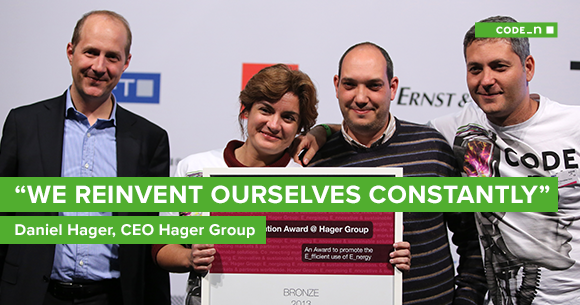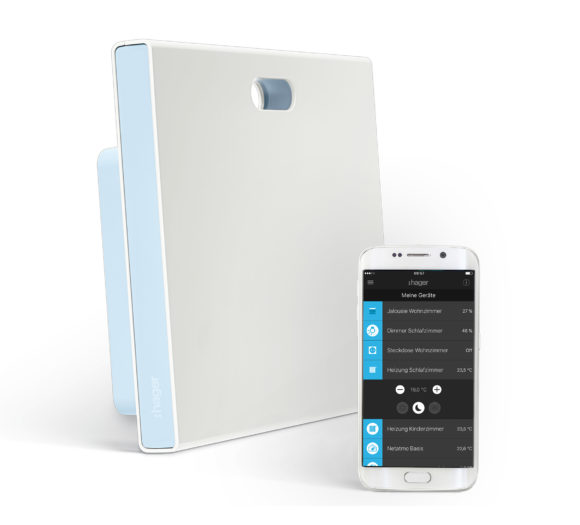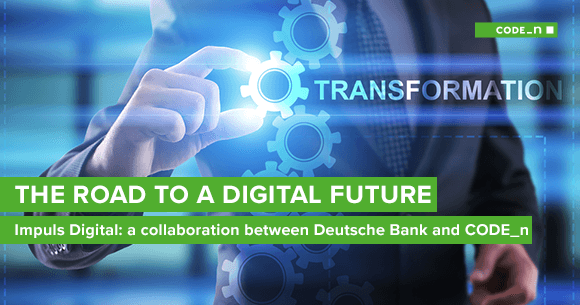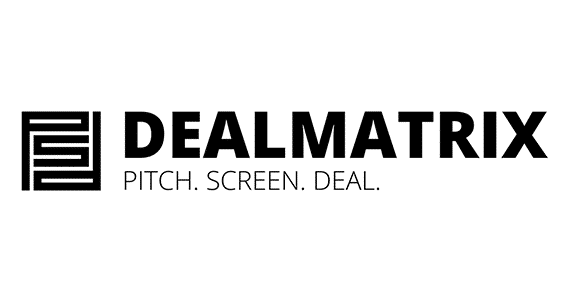Corporate Innovation | Hager Group: "Digitization is changing every aspect of our business"
Digitization, digital transformation, industry 4.0 – these buzzwords, along with their inherent opportunities, are currently on the minds of established companies from the industry. Yet how does one deal specifically with this digital transformation? What solution strategies are being implemented to propel traditional industries into the future? And at the end of the day, what has been proven to be successful? CODE_n shines a light into the darkness and talks with decision-makers from the CODE_n community. We ask about their lessons learned and actions taken off the beaten path in order to blaze new trails – Get excited about our exclusive insights into the world of corporate innovation! Today we are speaking with the CEO of CODE_n partner Hager Group, Daniel Hager. This family company is one of the leading providers of electro-technical installation solutions and has been an active partner in the CODE_n community with various innovation activities since 2013.

CEO Daniel Hager (left) presents the “Recognition for E_nnovation @ Hager Group” award for the CODE_n13 CONTEST – here to the Lightbee Corporation.
This long-standing company from Germany has been operating quite successfully worldwide for decades now and has recently been focusing more and more on intelligent building control systems along with energy distribution, cable routing and safety technology. Daniel Hager will be telling us how he is leading the company into the future, relay some of his experiences and take stock of the innovation activities up until now. In addition, he will also talk about the significance of collaborations between large companies and startups in order to drive innovation activities. Don’t miss the event on the topic of “Corporate-Startup Collaboration” in CODE_n SPACES on June 22, 2017. You’ll get a look behind the scenes at real collaborations and hear reports about their experiences.
1. Hello Mr. Hager, thank you for giving us this opportunity to exchange ideas with you. The Hager Group is one of the innovation leaders in its industry. Where does this drive to blaze new trails and the dissatisfaction with the status quo come from?
Simple really: If today we were to settle for the status quo, tomorrow we would no longer be an innovation leader. And the day after tomorrow, we would then possibly disappear from the market entirely. Having said that: Our core competence is that we always develop new, better, more satisfying solutions for and with our customers, we perfect them and then bring them to market. This is our raison d’être. It is also what we do best and we have a lot of fun doing it. That’s more than enough drive.
2. As CEO of a highly successful family company, what do you think of the topic of digitization?
That’s a similar question to the one raised about globalization: It is simply a fact. It continues to move forward, sometimes even sideways or even sometimes takes a step backwards. And just like globalization, it offers increased risks for a company as well as enormous opportunities that must be understood and seized upon. And that’s exactly what we are doing. Because digitization is changing every aspect of our business.
I’ll give you a few examples: Today we can communicate more quickly and directly with our electricians and support them during installation. In addition, the digital networking, control and maintenance of the entire electro-technical infrastructure, which we offer from one source, opens up promising markets to us. On the other hand, e-commerce also offers new sales opportunities that we are taking a very close look at.
Or take manufacturing, for example: Digitized tool management has already changed a lot for us in production. Currently, intelligent software at our headquarters in Blieskastel controls parts of the production process. All tools are networked together and this enables highly efficient, customer-specific and flexible manufacturing. Industry 4.0 is already the reality there.
Digitization also changes a few things on the part of our customers. We are working on a “smart home” in which all electro-technical processes are automatically recorded, analyzed and optimized, and it can also communicate with the outside world via the “Internet of things.” As experts in building automation, we are a driver of this development because it will lead to more energy-efficient, comfortable and safer buildings. For us, this also means that, along with hardware, the software also forms an increasingly important part of our solutions.
And not least, digitization is also changing our traditional business model. Traditionally, we passed on our solutions to the wholesale trade, which sold them to electricians and ultimately to the end customer. Today, the end customer is increasingly better informed and is now more of a deciding factor as to which switch, intercom and alarm system is installed. That’s why we have recently starting moving more in the direction of the end customer, which is a relatively new experience for us.
3. Currently, there is a lot of talk about the disruption of entire industries and groundbreaking upheavals due to digital transformation. In your opinion, what are the current challenges faced by traditional, established companies?
If you mean us: At the Hager Group, there is a long tradition of adapting our business to market developments and reinventing ourselves time and time again. Otherwise, we would not be a successful, continually-growing company. At the same time, we also have strong values as a family business, which guide us and accompany us through all changes. Our company is still led by the same family that founded the Hager Group over 60 years ago. At our company, we don’t change the management team every two years, we are not driven by investor interests wanting a change in strategy and there are no short-lived reorganizations. I have noted that this is something that is currently extremely attractive to young talent and new employees.
And that is the specific challenge, in this area of tension between innovation and stability. Today, you have to act more quickly, more efficiently and with more flexibility, you have to constantly question your processes. You have to recognize trends and develop models for the future. This only works when you open yourself up to the outside world, approve new methods and continually question your own work methods. We have to remain true to ourselves through constant change. And it goes without saying that this is the paradox.
4. You have been involved in the CODE_n community as a corporate partner since 2013. You have come into contact with innovative startups through this partnership which are stirring up your industry with new ideas. For the CODE_n13 CONTEST, you honored three special startup business models with the “Recognition for E_nnovation @ Hager Group” award related to the topic of smart energy / IoT. What was your intention behind awarding these prizes?
We committed to a partnership with CODE_n because we wanted to make new contacts, get to know innovative persons and better understand how startups tick. This has been a tremendously valuable experience from which we are still earning dividends. We have seen some great work being done and wanted to reward projects with our prize that, in our opinion, are especially innovative and worthy of support.
5. The CODE_n Startup finalists Tado, Codeatelier and Lightbee Corporation were able to win you over with their ideas. Did this result in a collaboration? If yes: What kind of collaboration? If no: why not?
Unfortunately, there has been no permanent collaboration with Lightbee Corporation because, at the end of the day, there was really no benefit to us for their concept. With Tado, we have brought a thermostat to the market that regulates the shutter position and inside temperature depending on the outside temperature and individual settings.
And with Codeatelier, we have been working closely together on a joint project for two years now. This resulted in coviva, which is a smartbox for controlling intelligent building functions. coviva can integrate and regulate switches, sockets, shutters, alarm systems and other building control systems as a wireless-based system. The building control system can be operated via a smartphone using the box and app. We presented this product at Light + Building 2016 as the first, open and consistently user-friendly system. The system is already available on the French market and will soon be launched on the German market.
In other words: All in all, the collaboration with CODE_n was a success – not least due to the momentum and inspiration given to our people by this collaboration. And conversely, I hope that we were also able to impart something of ourselves as an established company on our startup colleagues. I can only ask that any young entrepreneur who has a suitable idea to please get in contact with the Hager Group. Honestly, we always have a sympathetic ear even though we may not always be as fast or reactive as a startup might wish.

Results of the collaboration with the startup Codeatelier: the coviva smartbox enables you to control intelligent building functions
6. In general, how important do you think a collaboration with a young company is for the innovative activities of established companies? How can this succeed?
The collaboration with startups is extremely important in order to continually receive fresh input and develop solutions which we wouldn’t be able to come up with by ourselves. Innovation loves fresh ideas, unconventional approaches and visions.
And established companies oftentimes simply don’t have enough time and space for this. Therefore, we need to create some room to maneuver using external partnerships. The fact that not all projects resulting from this can be successful is the nature of the thing. And this is not a big deal.
Naturally, two worlds will collide here. On the one hand, you have very structured processes, proven decision-making channels and sometimes even a certain bit of structural yield. On the other hand, there are enormous amounts of flexibility and creativity, but naturally also inexperience. The collaboration can succeed when both sides can comprehend something from each other’s strengths and learn from it.
7. What (innovation) activities are you currently undertaking to take the Hager Group into the future?
Among other things, we are taking part in research projects as part of the Designnetz demonstration project to integrate renewable energies into the supply system. This project from the Ministry for Economic Affairs and Energy is supported by a funding program worth millions. We want to show how intelligent networks can ensure a safe and efficient energy supply with a temporary power feed of 100 percent renewable energy – put simply, we are working on the energy supply system of the future within this project.
At the same time, we encourage the ideas and innovative power of our employees, which is the lifeblood of a company such as ours. Our Tech Days are an example of this, which give our employees the opportunity to discover internal projects as well as innovative, external concepts. 11 of the 21 projects came from our employees. The other 10 were from startups. The goal here is to encourage innovation as well as motivate employees to exchange ideas and get inspired by external concepts that will help to enhance their own ideas.
8. With your many years of experience as a visionary and pioneer, we are excited to hear about your lessons learned – what method has proven useful to you and which innovation approaches have you had to reject?
We are constantly rejecting things. Because we are constantly trying out new approaches. And we know that we still don’t have all the answers. But we try to ask the right questions. That’s how you get innovation. Maintaining a sense of curiosity is for me an essential quality of an innovative company.
9. And we also find again and again that the subject of leadership in times of digitalization is quite a hot topic. Do you get the impression that the requirements for a leadership personality are currently changing?
Of course. Actually, “manager” is not really the correct term anymore because today we no longer really need a “controller” but rather enablers, coaches, critics, mentors and, in the best case, a combination of all these qualities. In times in which decisions have to be made at all levels quickly and responsibly, the actual task of a manager is to give up responsibility, bestow trust and turn their colleagues into good decision-makers. We want to become an amalgamation of responsible employees who can make the right decisions at their level and bring forward important matters.
10. There is a lot of talk today about flexible teams and agile methods for internal and external collaboration. How do you categorize this trend or are you also already implementing these kinds of methods in your own company?
Naturally, we have to adapt our work methods and partially reinvent them, and we have to disrupt entrenched thought patterns and work routines. For example, in project management and product development, we are already working with parts of the Scrum model, subdividing planning processes into sprints, etc. And the Tech Days that I mentioned before are also an excellent example of bridge building between employees and external teams.
In general, we are trying out a lot of things in this vein. We offer our employees workshops and lectures on the topics of creativity and collective intelligence during their regular work day. During the last “Creativity Week,” the Lego Serious Play© was quite well received. The goal is to make available to our employees concrete methods for creative thinking. We organized another project within the scope of the European Sustainability Week: We hosted a brainstorming contest together with approx. 100 school children on the topic of “What will the networked house of tomorrow for seniors look like?”. On the one hand, this is an ideal opportunity to get young people interested in our development priorities as well as the industry itself, and it also gave us the opportunity to try out alternative work methods.
Mr. Hager, thank you very much for talking with the CODE_n community regarding your valuable experiences in the area of corporate innovation. We look forward to further updates about the Hager Group as it treads the path towards a digital future.
In future, CODE_n will also be talking with other visionaries and pioneers from commerce and industry as well as reporting on groundbreaking insights and how companies are dealing with this digital transformation.
Stay tuned and don’t forget to register for the newsletter so that you don’t miss any of the updates, events and trends from the CODE_n community.





Comments